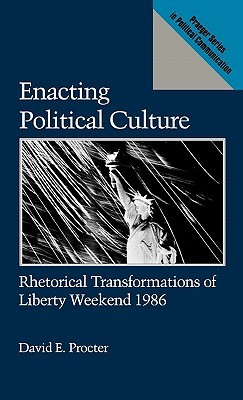
- We will send in 10–14 business days.
- Author: David Procter
- Publisher: Praeger
- ISBN-10: 0275934896
- ISBN-13: 9780275934897
- Format: 14.7 x 21.6 x 1.8 cm, hardcover
- Language: English
- SAVE -10% with code: EXTRA
Reviews
Description
From July 3-6, 1986, Americans hailed the 4th of July and the centennial of the Statue of Liberty in a celebration that became officially known as Liberty Weekend. In this study, David Procter analyzes the process of enacting political culture by examining how various political, religious, and ethnic groups transformed the experience of Liberty Weekend into a validation of their own individual social and political agendas. Broader in scope than any previous published work on political culture and the political ideal of liberty, Procter's work vividly demonstrates the rhetorical process by which American politicians, pundits, and community spokespersons convert political celebration into motivation for sociopolitical goals.
Following an introductory chapter on the relationship between symbols and culture, Procter provides an overview of the analysis of political culture as well as general comments on Liberty Weekend itself. Subsequent chapters analyze how specific groups used the weekend to further their own sociopolitical goals. Procter explains how blacks transformed the celebration into competing statements of community identity, explores how Ronald Reagan converted the event into a celebration of his Revolution, and examines how a nationalist group cast the event into a motive for an involved or confrontational American foreign policy. He then synthesizes the significant themes and symbolic clusters from these three chapters to determine what these webs of discourse can tell us about American political culture. Procter concludes that each group called on the ideograph Liberty to justify their specific, yet diverse, political agendas and that these disparate groups were able to use this common symbol because fundamentally Liberty represents America's cultural persona of pursuing a dream of success and achievement. Ideal as supplemental reading for courses in political communication and rhetorical criticism, this book represents a major contribution to our understanding of the complex nature of American political culture.
EXTRA 10 % discount with code: EXTRA
The promotion ends in 18d.20:45:56
The discount code is valid when purchasing from 10 €. Discounts do not stack.
- Author: David Procter
- Publisher: Praeger
- ISBN-10: 0275934896
- ISBN-13: 9780275934897
- Format: 14.7 x 21.6 x 1.8 cm, hardcover
- Language: English English
From July 3-6, 1986, Americans hailed the 4th of July and the centennial of the Statue of Liberty in a celebration that became officially known as Liberty Weekend. In this study, David Procter analyzes the process of enacting political culture by examining how various political, religious, and ethnic groups transformed the experience of Liberty Weekend into a validation of their own individual social and political agendas. Broader in scope than any previous published work on political culture and the political ideal of liberty, Procter's work vividly demonstrates the rhetorical process by which American politicians, pundits, and community spokespersons convert political celebration into motivation for sociopolitical goals.
Following an introductory chapter on the relationship between symbols and culture, Procter provides an overview of the analysis of political culture as well as general comments on Liberty Weekend itself. Subsequent chapters analyze how specific groups used the weekend to further their own sociopolitical goals. Procter explains how blacks transformed the celebration into competing statements of community identity, explores how Ronald Reagan converted the event into a celebration of his Revolution, and examines how a nationalist group cast the event into a motive for an involved or confrontational American foreign policy. He then synthesizes the significant themes and symbolic clusters from these three chapters to determine what these webs of discourse can tell us about American political culture. Procter concludes that each group called on the ideograph Liberty to justify their specific, yet diverse, political agendas and that these disparate groups were able to use this common symbol because fundamentally Liberty represents America's cultural persona of pursuing a dream of success and achievement. Ideal as supplemental reading for courses in political communication and rhetorical criticism, this book represents a major contribution to our understanding of the complex nature of American political culture.


Reviews